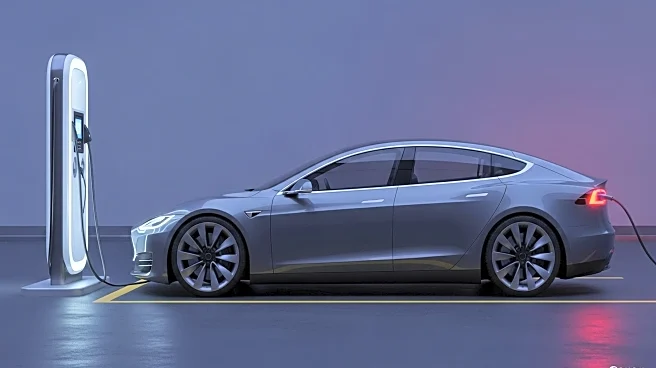What is the story about?
What's Happening?
The UK auto market has seen a significant increase in electric vehicle sales, with plugin EVs capturing 35.5% of the market share in September. This marks a rise from 29.4% year-on-year, with battery electric vehicles (BEVs) accounting for 23.3% and plugin hybrids (PHEVs) for 12.2%. The reintroduction of BEV purchase incentives has contributed to this growth, despite initial implementation challenges. Tesla emerged as the leading BEV brand, capturing 10.9% of the market share, followed by Ford and BYD. The market dynamics are influenced by new model launches and pricing strategies, with several brands introducing affordable BEV options.
Why It's Important?
The increase in electric vehicle sales in the UK reflects a broader shift towards sustainable transportation solutions. This trend is significant for the automotive industry as it indicates growing consumer acceptance and demand for electric vehicles. The rise in market share for BEVs and PHEVs suggests potential long-term changes in vehicle manufacturing and sales strategies, with implications for environmental policies and carbon emission targets. Companies like Tesla, Ford, and BYD are positioned to benefit from this shift, potentially influencing global market trends and encouraging further innovation in electric vehicle technology.
What's Next?
The UK auto market is expected to continue evolving with more electric vehicle options and competitive pricing strategies. The impact of government incentives and consumer demand will likely drive further growth in BEV and PHEV sales. Automakers may focus on expanding their electric vehicle offerings and improving infrastructure to support increased adoption. The market will also watch for potential changes in government policies and incentives that could further influence sales trends and industry dynamics.
Beyond the Headlines
The shift towards electric vehicles in the UK highlights broader environmental and economic implications. As the market adapts to new technologies, there may be challenges related to infrastructure development, such as charging stations and grid capacity. Additionally, the transition to electric vehicles could impact employment in traditional automotive sectors, necessitating workforce retraining and adaptation. The focus on sustainability may also drive innovation in related industries, such as renewable energy and battery technology.


















